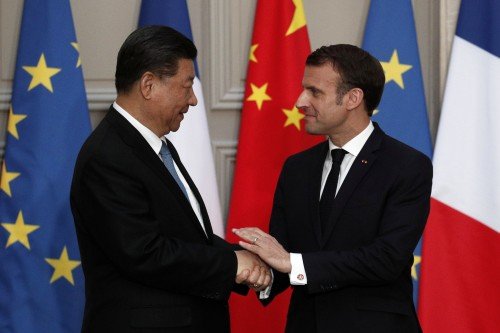
China's relationship with France has a long and complex history, marked by periods of cooperation and tension. In recent years, the relationship between the two countries has been shaped by economic and strategic interests, as well as by divergent views on issues such as human rights and regional security. In this blog post, we will examine the current state of China's relationship with France and explore the factors that are driving their interactions.
Economic Ties
Economic ties have been a major driver of China's relationship with France in recent years. China is France's largest trading partner in Asia, and France is one of China's largest trading partners in Europe. The two countries have a strong economic relationship, with bilateral trade exceeding $60 billion in 2020. China is also a significant investor in France, with Chinese companies investing in a range of industries, including technology, energy, and real estate.
One of the key areas of cooperation between China and France is infrastructure development. In 2019, the two countries signed a memorandum of understanding to collaborate on the Belt and Road Initiative, China's ambitious infrastructure development project. Under the agreement, France will work with China to develop infrastructure projects in third-party countries, with a focus on sustainability and environmental protection.
China's economic ties with France are significant, with bilateral trade between the two countries exceeding $60 billion in 2020. China is France's largest trading partner in Asia, and France is one of China's largest trading partners in Europe. The two countries have a strong economic relationship, with Chinese companies investing in a range of industries in France, including technology, energy, and real estate.
One of the key areas of cooperation between China and France is infrastructure development. In 2019, the two countries signed a memorandum of understanding to collaborate on the Belt and Road Initiative, China's ambitious infrastructure development project. Under the agreement, France will work with China to develop infrastructure projects in third-party countries, with a focus on sustainability and environmental protection.
France has also welcomed Chinese investment in key sectors of the French economy. In recent years, Chinese companies have acquired a number of French firms, including luxury goods brands, and invested in renewable energy projects. These investments have helped to strengthen economic ties between the two countries and create new opportunities for growth.
However, the economic relationship between China and France has also faced challenges. France, along with other European countries, has expressed concerns about China's economic policies and practices, including issues such as intellectual property theft and market access restrictions. These concerns have led to increased scrutiny of Chinese investment in France and other European countries.
Overall, economic ties between China and France are an important aspect of their relationship, but they are also influenced by geopolitical tensions and concerns about China's economic policies and practices. As both countries continue to navigate these issues, the future of their economic relationship remains uncertain.
Strategic Interests
China and France also share strategic interests, particularly in the area of global governance. Both countries are committed to upholding the principles of multilateralism and the rules-based international order. France has been a vocal supporter of China's inclusion in global governance structures, such as the United Nations Security Council and the World Trade Organization.
However, their cooperation on strategic issues has been complicated by differences in their respective geopolitical interests. France has been critical of China's assertiveness in the South China Sea and its treatment of Uighur Muslims in Xinjiang. These issues have strained the relationship between the two countries, with France taking a more confrontational approach towards China in recent years.
China and France share strategic interests in several areas, including global governance and multilateralism. Both countries are committed to upholding the principles of multilateralism and the rules-based international order. France has been a vocal supporter of China's inclusion in global governance structures, such as the United Nations Security Council and the World Trade Organization.
China and France also cooperate on a range of strategic issues, such as climate change and nuclear non-proliferation. In 2015, China and France were key players in the negotiations that led to the Paris Agreement on climate change. Both countries have since worked together on a number of initiatives aimed at reducing carbon emissions and promoting renewable energy.
However, their cooperation on strategic issues has been complicated by differences in their respective geopolitical interests. France has been critical of China's assertiveness in the South China Sea and its treatment of Uighur Muslims in Xinjiang. These issues have strained the relationship between the two countries, with France taking a more confrontational approach towards China in recent years.
In addition, China's growing influence in Europe has raised concerns in France and other European countries about China's strategic intentions. Some policymakers in France have expressed concern about China's "One Belt, One Road" initiative, which they see as an attempt to expand China's influence in Europe and other regions.
Overall, while China and France share some strategic interests, their relationship is also shaped by geopolitical tensions and divergent views on key issues. As both countries continue to navigate these challenges, the future of their strategic relationship remains uncertain.
Cultural Exchanges
Cultural exchanges have been another important aspect of China's relationship with France. The two countries have a long history of cultural exchange, dating back to the 18th century when French Jesuit missionaries first arrived in China. Today, there are a large number of Chinese students studying in France, and the two countries regularly exchange cultural delegations.
However, cultural exchanges have also been affected by political tensions between the two countries. In recent years, France has been critical of China's human rights record, particularly its treatment of the Uighur minority. This has led to a cooling of cultural exchanges, with some French universities canceling exchange programs with Chinese institutions.
Conclusion
China's relationship with France is complex and multifaceted, shaped by economic, strategic, and cultural factors. While the two countries have significant economic ties, their cooperation is complicated by geopolitical tensions and differences in their respective interests. Cultural exchanges have also been affected by political tensions, particularly around issues of human rights. As China continues to assert itself on the global stage, its relationship with France is likely to remain an important and closely watched dynamic.








